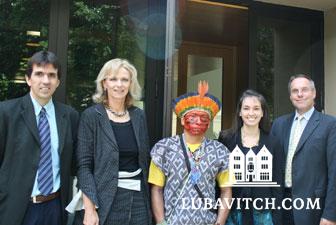(lubavitch.com) When genetic code from rainforest plants gets patented and sold, how much profit goes to local tribes who conserved and cultivated the plant for years?
To share none of the profits, advocates say, is a bio-piracy. It’s not a household term, but it’s troubling enough that the United Nations held a twelve-day conference, which ended on May 30, to hammer out a legal framework for combating this growing issue.
A leading voice against bio-piracy in the Amazon spelled out the ethical and economical ramifications of this issue before graduate students at the Lauder Business College in Vienna on June 6.
Hosting dialogs on timely issues is part of LBC’s mission to educate business people who are leaders for their communities, in secular and Jewish life.
“The students are hybrid in their thinking. We encourage them to weigh economic ideas from many points of view, and to decide where their point of view assists or collides with the needs of their community,” said Mag. Silvia Kucera, dean of the Lauder Business School.
Lauder Business College, founded in 2003 by cosmetics magnate Ronald S. Lauder, is continental Europe’s only university to follow a Jewish calendar and offer kosher cafeteria and synagogue on campus. Chabad Lubavitch directs the school’s Jewish Heritage Center, which is responsible for the Judaic studies courses and Jewish life on campus.
Along with a sound business background, LBS’s Jewish Leadership Program is “working to provide students with fundamental Jewish knowledge, pride and identity,” said Rabbi Shaya Boas, development director of LBS and the Jewish Heritage Center. “So they will return to their Jewish communties after graduation ready to lead.”
This approach is what brought Mr. Michael Schmidlehner, President of Amazonlink.org and José Nilson Saboia Kaxinawá, a representative of the indigenous peoples, to LBS. Schmidlehner is president of Amazonlink, a non-governmental organization based in the Amazon jungle state of Acre, Brazil.
An Austrian by birth, Schmidlehner gained worldwide attention for his campaigns to prevent corporate patenting use of indigenous Amazonian cupuacu pods and biopharmecutical development of a toxin found on the skin of the monkey frog, an indigenous species, without including local peoples in the profit scheme.
To host the “First Intercultural Dialog on Biological Piracy” is “breaking new ground,” said Mag. Kucera. Previous dialogs at LBS have included a presentation by the observant Jewish Nobel Laureate Kenneth Auman.
Demand for the dialog arose from a research project conducted by of an Israeli LBS student. His legal issues professor knew Schmidlehner from his work at the firm of Strohal, Kretschmer, Rebasso, a supporting partner of the dialog.
On the Sunday after the event, 50 of the school’s 190 students packed up to experience the other side of LBS’s leadership training. At a three-day weekend retreat in the Lake Balaton District in Hungary, over the holiday of Shavuout, students explored the underpinnings of Jewish thought and tradition.
Funded with the support of the Morasha Foundation, the retreat is part of the Jewish Leadership Program’s year-round schedule of classes and events. Students who participate in the leadership program are eligible for substantial scholarships at LBS. Participating in the Shavuout retreat was not so much of an obligation as it was a gift, said Rabbi Boas.
“Taking students away from their books and papers for a weekend in a beautiful setting gave them the opportunity to think, to discuss and to grow in their personal relationship with their Jewish heritage.”

Be the first to write a comment.